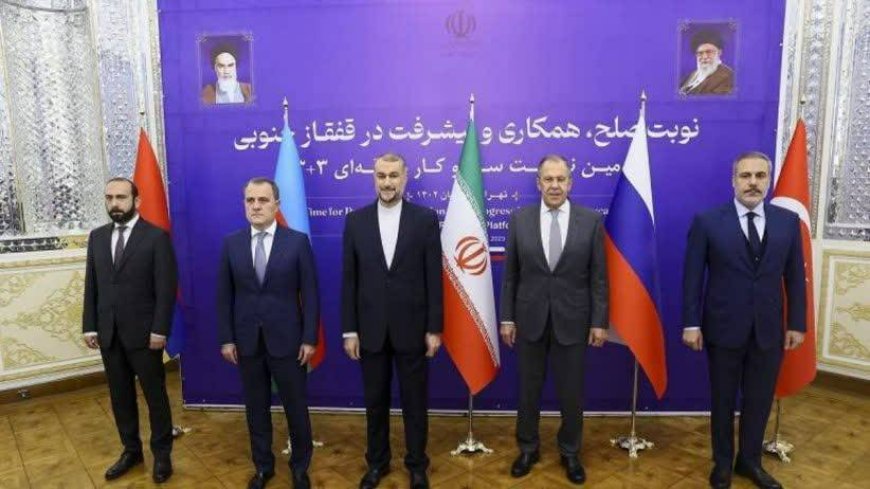3+3 Foreign Ministers' Meeting: Toward Regional Collaboration in the South Caucasus
The Caucasus region, nestled in a strategic crossroads connecting the East, West, North, and South, has long been a focal point for geopolitical maneuvering. Its proximity to key areas such as the Heartland and Rimland, coupled with its border with Russia, imbues it with immense significance on the global stage. The discovery of abundant energy resources following the end of the Cold War drew the attention of major powers to the South Caucasus, underscoring its strategic importance for both regional and extra-regional players.

Issues such as Turkey's interference in the South Caucasus crises, the lingering conflicts between Azerbaijan and Armenia, Russia's potential role in shaping the South Caucasus dynamics, the presence of Israel, and the indirect influence of NATO and Western powers have all contributed to the intricate tapestry of challenges the region faces today. Amidst these complexities, the Islamic Republic of Iran has consistently advocated for security and stability in the South Caucasus, emphasizing the need for diplomatic solutions to prevent future crises.
Recent agreements between Azerbaijan and Armenia regarding the annexation of the disputed Nagorno-Karabakh to the regime in Baku were viewed by some naïve observers as easing tensions in the Caucasus, all to no avail.
However, regional countries strive to avert future conflicts through dialogue. The inaugural meeting of the 3+3 foreign ministers' format in Tehran marked a significant step towards addressing regional issues through collaborative mechanisms. This inclusive format, encompassing South Caucasus nations and neighboring states like Russia, Turkey, and Iran, offers a promising avenue to expedite the peace process and mitigate external influences.
Today, the peace efforts face challenges from extra-regional players like France, whose arms deals with Armenia have raised concerns about their impact on regional stability. While Paris asserts its commitment to the peace process in the Caucasus, suspicions persist regarding ulterior motives, including the growth of militarism in the Caucasus, curtailing Russia's longstanding hegemony in the region, and enhancing Western ties with Armenia. Such moves underscore the complex web of geopolitical interests at play in the region, as both Russia and Western powers vie for leverage in the peace negotiations between Armenia and Azerbaijan.
Armenia's recent diplomatic overtures to Western nations signal a desire for external support against Russian dominance. Since the outset of 2024, a discernible trend has emerged, characterized by a notable escalation in diplomatic engagements undertaken by Armenian authorities with Western nations. Evidently, Nikol Pashinyan strategically pursues a recalibration of power dynamics, seeking checks and balances against Russian influence through diplomatic channels with the United States, France, and the European Union. It is imperative to underscore the need for prudence on the part of Yerevan and Baku to ensure that these diplomatic maneuvers do not precipitate renewed tensions and conflict in the region. Failure to exercise caution in their interactions and agreements could perpetuate non-constructive and intricate competitions in the Caucasus, exacerbating regional tension. Conversely, should Azerbaijan and Armenia successfully navigate these complexities, removing obstacles to peace and concluding a comprehensive peace agreement, they can redirect their focus towards paramount issues such as economic growth and development. This transformative shift holds the promise of a brighter future for both nations, fostering peaceful coexistence and amicable relations with neighboring countries.
In summary, the Caucasus region faces intricate challenges with geopolitical maneuvering, historical conflicts, and external influences. Recent diplomatic efforts, exemplified by the 3+3 foreign ministers' meeting in Tehran, show promise in addressing regional issues collaboratively. However, careful navigation is crucial, especially concerning the influence of extra-regional players like France. To secure a brighter future, sustained commitment to comprehensive peace agreements is essential. The region's potential for stability and progress lies in prioritizing dialogue, overcoming historical obstacles, and fostering peaceful cooperation. Through unwavering dedication to diplomacy, the Caucasus can transcend its turbulent past and pave the way for a harmonious and prosperous future.













































